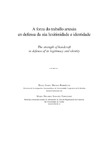Mostrar o rexistro simple do ítem
A forza do traballo artesán en defensa da súa lexitimidade e identidade
| dc.contributor.author | Molina Rodríguez, Diana Isabel | es_ES |
| dc.contributor.author | Sánchez-Fernández, María Dolores | es_ES |
| dc.date.accessioned | 2014-04-30T10:46:58Z | |
| dc.date.available | 2014-04-30T10:46:58Z | |
| dc.date.issued | 2011 | es_ES |
| dc.identifier.citation | Anuario da Facultade de Ciencias do Traballo da Universidade da Coruña, 2011, 2: 169-185. ISSN: 2173-9811 | es_ES |
| dc.identifier.issn | 2173-9811 | es_ES |
| dc.identifier.uri | http://hdl.handle.net/2183/11963 | |
| dc.description.abstract | [Resumo] O movemento social é de gran transcendencia histórica ao longo dos tempos. Plasmaremos nesta investigación a importancia que adquire o traballo artesán a través do movemento social reivindicativo por medio dun instrumento folclórico. O pobo artesán persegue con este movemento social a lexitimidade e a súa propia autodefinición. O compromiso histórico reconstrúese mediante a definición do traballo, en especial do traballo colectivo artesán. A definicióndo traballo plásmase como impulso do compromiso colectivo, que chega a mobilizar a cidade a través de actos folclóricos que reivindican o traballo artesanal e alcanzan a dignificar evalidar os sistemas creativos da autodefinición da nación. Arestora ponse en dúbida o rol social que ocupan os actores do folclore e as organizacións nocontorno do traballo, o seu compromiso colectivo dentro da sociedade, mais a mobilización de toda unha cidade consegue reivindicar que o traballo artesanal dignifica e valida os sistemas creativos de autodefinición da nación. Os sistemas organizativos mutuais, conceptos derecoñecemento e solidariedade, son necesidades que se plasman como resposta ao coñecemento dunha nación. | es_ES |
| dc.description.abstract | [Abstract] Social movement has had a great historical significance over time. In this research, the importance of handcraft is reflected through the demanding social movement using a folk instrument. With this social movement the artisan community pursues legitimacy and selfdefinition. Historic commitment is reconstructed through the definition of work, in particular,handcrafted work. The definition of work is reflected as the force of the collective commitment,mobilizing the city through traditional actions that defend craftsmanship, dignifying and validating the creative systems of the nation’s self-definition. Although the social role that the actors and organizations play is put in doubt, once the collective commitment is established,the mobilization of an entire city manages to show that handcrafted work dignifies and validates the nation’s creative systems of self-definition. Mutual organizational systems, concepts ofrecognition and solidarity, are requirements which are reflected as a response to the recognitionof a nation. | es_ES |
| dc.language.iso | glg | es_ES |
| dc.publisher | Universidade da Coruña | es_ES |
| dc.subject | Traballo artesán | es_ES |
| dc.subject | Movemento social | es_ES |
| dc.subject | Autodefinición rexional | es_ES |
| dc.subject | Lexitimidade | es_ES |
| dc.subject | Handcraft | es_ES |
| dc.subject | Social movement | es_ES |
| dc.subject | Regional self-identification | es_ES |
| dc.subject | Legitimacy | es_ES |
| dc.title | A forza do traballo artesán en defensa da súa lexitimidade e identidade | es_ES |
| dc.title.alternative | The strength of handcraftin defence of its legitimacy and identity | es_ES |
| dc.type | info:eu-repo/semantics/article | es_ES |
| dc.rights.access | info:eu-repo/semantics/openAccess | es_ES |
Ficheiros no ítem
Este ítem aparece na(s) seguinte(s) colección(s)
-
REV - ACT - nº 02, 2011 [24]
-
GI-GREFIN - Artigos [75]






